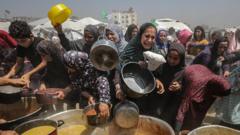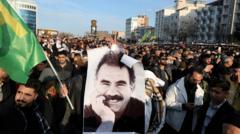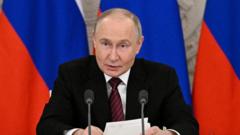The Kurdish Workers’ Party (P.K.K.) has decided to lay down its arms, which may lead to significant political changes in Turkey and its neighboring countries.
Kurdistan Workers' Party Declares End to Armed Insurgency Against Turkey

Kurdistan Workers' Party Declares End to Armed Insurgency Against Turkey
The P.K.K.'s announcement to disarm marks a potential turning point for Kurdish rights in Turkey and the region.
In a historic announcement, the Kurdistan Workers' Party, known by its Kurdish acronym, P.K.K., declared on May 12, 2025, that it would cease armed conflict with the Turkish state. This decision has emerged a few months after its imprisoned leader, Abdullah Ocalan, encouraged the group to disarm and disband, suggesting that the armed struggle had outlived its initial goals. This shift comes after four decades of intense insurgency, which has led to over 40,000 fatalities, complicating the landscape of Kurdish rights in Turkey.
The P.K.K. originally sought independence for Turkey's Kurdish minority, but more recently has shifted its focus toward advocating for the cultural and political rights of Kurds within Turkey. Their recent statement expressed confidence that they have now elevated the Kurdish issue to a point where resolution can be achieved through democratic means. Furthermore, the P.K.K. has identified Ocalan as the ideal leader for overseeing the disarmament process and has urged Turkey’s Parliament to take part in this transition.
This decision could significantly impact Turkish politics, particularly offering a pivotal victory for President Recep Tayyip Erdogan, who has long grappled with the P.K.K. insurgency. While Turkish officials have publicly stated that no concessions were made to the P.K.K., there is optimism from Turkey's pro-Kurdish party regarding potential advancements in Kurdish rights, including cultural and educational improvements.
However, the repercussions of this disarmament may extend beyond Turkey's borders, influencing various Kurdish militias across Syria and Iraq. The Kurdish population—estimated at around 40 million and spread across Turkey, Syria, Iran, and Iraq—has historically faced suppression of their cultural and linguistic rights.
As the P.K.K. announces an end to its armed struggle, the future of its networks and bases in the mountains of northern Iraq remains uncertain. Turkey has continued military operations against P.K.K. strongholds in these areas, branding them as terrorist threats. This announcement signifies a critical juncture in regional dynamics, with implications that may resonate throughout the Kurdish community across the Middle East.






















